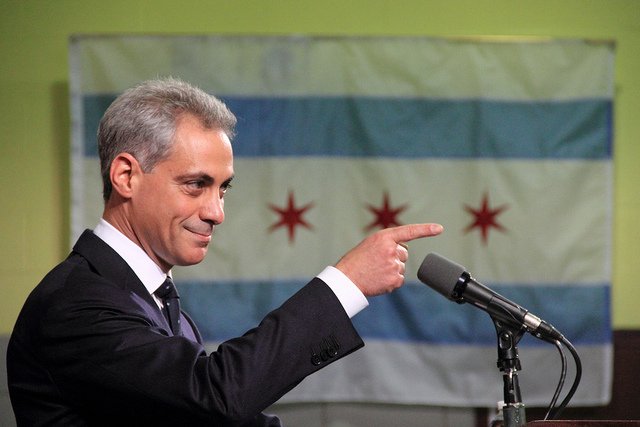
AND THE CROWD GOES WILD FOR JUDGE PETER FLYNN! Today, the lawsuit filed against the City of Chicago by the Institute of Justice was brought in front of the judge. The lawsuit claims that the 200ft buffer that food trucks must put between themselves and any existing
“restaurant” (steakhouse to gas station) and mandatory GPS requirements are unconstitutional. The judge heard IJ’s argument as well as the city’s; his honesty and reason provided a much-needed dose of honesty and reason on the legislative side of things.
Here’s a summary of what he said, according to DNA Info and the live tweets we’ve gathered from Kristin Casper, co-owner of Schnitzel King, one of the food trucks represented in the lawsuit:
1) 200 Foot Ban: “Judge Peter Flynn said the effect of the city’s ordinance, which forbids food trucks from setting up shop within 200 feet of an established restaurant, appeared to be to ‘exclude food trucks from the entire Loop and then some…Flynn took issue with the ordinance’s definition of a restaurant to include convenience stores like 7-Eleven.’” “Judge says the purpose and regulation doesn’t match up re: 200 ft rule”-@kristinrcasper
2) GPS Requirements: The judge isn’t “comfortable” with this part of the city’s ordinance. He wanted to know “how the city proposes to protect against misuse of the data.” The judge asked “Does the city have the right to put GPS on all cars & monitor?”
The Sun Times reports “…requiring food truck operators to install GPS systems so the city and the public can monitor their whereabouts — violates the vendors’ rights ‘to be free of unreasonable searches and seizures.’”
3) Next Steps There will be a status on September 10, but the actual court hearing is TBD.
For the first time perhaps ever, there is a glimmer of hope on the legislative horizon for food trucks in Chicago all because a reasonable judge. ”This is a big win, make no mistake about it,” said Bert Gall, an attorney for theInstitute for Justice, also nicknamed the Patron Saint to Food Trucks. “We get a chance to show this was protectionist legislation….The city was trying to cut this case off at the knees, and it failed.”







